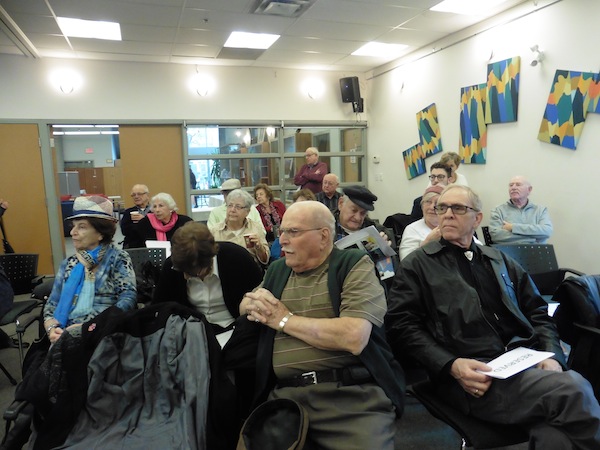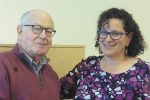Ken Levitt, JSA president, with Debby Fenson, who was one of the singers at the event. (photo by Binny Goldman)
On Nov. 25, Jewish Seniors Alliance’s first Empowerment Series in partnership with the Jewish Museum and Archives of British Columbia was held at the Peretz Centre for Secular Jewish Culture.
Gyda Chud, JSA vice-president and Peretz president, and Ken Levitt, president of JSA, welcomed the 65 people gathered, with Levitt thanking Chud and citing her as an example of koach, strength, in all she did.
The theme of this year’s series is Food: The Doorway to Our Culture, so the partnership with the JMABC was a natural fit, as its theme for the year is “Feeding the Community,” said Michael Schwartz, coordinator of programs and development of the JMABC, who briefly described how the museum functions and the extent of its collection.
As for its theme, Schwartz said the JMABC has created a new podcast, called Kitchen Stories. Episodes include stories about Sephardi Jews adapting to the culture of a different land, and that of a blended family from Ukraine and Rhodes. Schwartz highlighted the story of a family in Haida Gwaii, where, he explained, contact is usually made through an event; a shared feast celebrating the catching of fish, for example, the preparing of the meal and then the partaking of it, all instrumental to the success of the project itself.
Often a dilemma is faced when adapting to a new food culture and discarding the former, said Schwartz. Questions often arise, Which self am I? Does this diminish my former self? Food represents identity, acceptability and relationships, he explained, adding that a new JMABC venture planned for the coming year is a supper club at the Peretz Centre, where each get-together will focus on a different cultural theme: Persian, Israeli and Mexican.
Shanie Levin, a vice-president of JSA, then shared stories of food with those gathered. Formerly involved in amateur theatre and more recently in Yiddish reading groups at the Isaac Waldman Jewish Public Library, Levin said she collected stories from several different perspectives. The first she read was an excerpt from Rhapsody in Schmaltz by Michael Wex, in which he lists the various blessings to be said before and after consuming foods. In the passage, Wex also notes the problem of dealing with a spoonful of milk that falls into the chicken soup. Does it render the whole soup non-kosher? Or just the pot? What if the family is poor and there is nothing else to eat? Referring to Wex’s book, Levin discussed how Ashkenazi Jews have remained close to their customs of origin while Sephardi Jews more often have adapted their food preparation according to the country in which they found themselves.
A crowd favorite was The Chicken Tale by Rabbi Daniel T. Grossman, which had everyone laughing, hearing about the rabbi who, traveling with a group of Jewish choir singers, finds himself in a town that knows nothing about the customs of Jews. Hoping to impress him, his hostess does some research at the local library. When she meets the rabbi, she informs him that she knows rabbis kill chickens, therefore, there is a chicken in the yard and the townspeople are waiting to witness the kill. However, the horrified rabbi says that he is not that kind of rabbi, but a praying and teaching rabbi. So, that night, they all eat fish.
Another story, A Town Called Roosevelt by Moishe Nadir, illustrated that a preconceived notion can be changed gradually with each course of a delicious meal.
A personal favorite was Challahs in the Ark by Rabbi Zalman Schachter-Shalomi, written about the time the Jews were expelled from Spain, eventually to relocate to Tzfat. The shul caretaker was desperate to know if he had found favor in God’s eyes. Knowing his wife was an expert challah baker, he asked her to bake 12 loaves, which he then placed in the Torah ark, thinking that, if they were gone in the morning, then he would know God had accepted his offering. In the meantime, the shamash, who had not been paid for many weeks and had a hungry family, was pleading with God to show him a sign that his prayers were being heard. Imagine his joy upon discovering the loaves of bread at the ark, which he thought to be a definite sign. This joy was echoed by the caretaker the next morning. Seeing the challahs were gone, he felt God had accepted them.

The audience was reluctant to let Levin stop, so she read one more story, a short version of Sholem Aleichem’s Chanukah Gelt. Her delivery held listeners’ rapt; they could envision the action, as each story enfolded.
A musical program followed, featuring Debby Fenson, Deborah Stern Silver and accompanist Elliot Dainow. Fenson is ba’alat tefilah (Torah reader) at Congregation Beth Israel, where she teaches b’nai mitzvah students; Stern Silver is a trained soprano who sings with Fenson at Beth Israel; and Dainow is musical director of the Unitarian Church, as well as being an accompanist for soloists and various ensembles, including the Vancouver Jewish Folk Choir, which calls the Peretz Centre home.
Introducing their program, Stern Silver said the songs being presented were of Ashkenazi sources. They included “Tayere Malkeh,” a Yiddish drinking song, performed with a drinking cup and an empty bottle of wine, and a song about having to eat potatoes every day, which had the audience eagerly joining in with the chorus of bulbes (potatoes). The third song transported everyone to the Israeli marketplace, “Shuk HaCarmel,” and “Rozhinkes mit Mandlen” (“Raisins and Almonds”), a lullaby sung to children, brought tears of recognition and nostalgia.
Several instruments were handed out and those in the audience became participants in the performance of “The Latke Song” by Debbie Friedman. For the final song, “Finjan,” the audience enthusiastically clapped along.
It is impossible to capture the warm feeling of shared chavershaft (camaraderie) prevailing in the room; a fargenign, a pleasure.
In addition to Chud, who was the convenor, the event was made possible with the help of JSA staff, and Karon and Stan Shear filmed it for JSA’s website. Here’s to continuing the singing of our songs and sharing our stories m’dor l’dor, from generation to generation, af eybik, forever.
Binny Goldman is a member of the Jewish Seniors Alliance of Greater Vancouver board.

